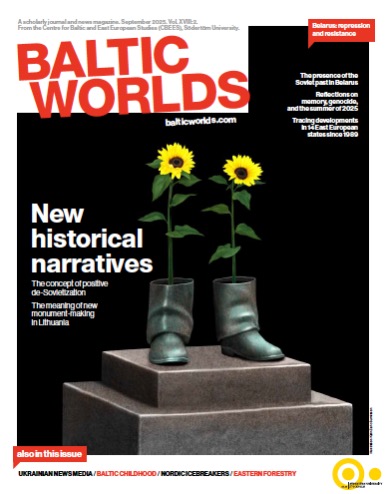León Poblete & H. Richard Nakamura
León Poblete, PhD candidate at the Department of Business Studies at Uppsala University, Sweden. Currently working on his doctoral dissertation in which he studies the dynamics of business-to-business relationships and complex business networks in industrial markets. The Swedish defense and security industry is the main empirical context in his research.
H. Richard Nakamura, assistant professor at the Centre for International Business Studies at the School of Business, Economics and Law at the University of Gothenburg, Sweden, holds a PhD in International Business Studies from Stockholm School of Economics, Sweden. His research concerns international business, management and entrepreneurship, especially regarding cross-border mergers and acquisitions and foreign direct investments in the Baltic Sea and East Asia regions.
view all contributors
Articles by León Poblete & H. Richard Nakamura
-
Civil society in Ukraine is, although under severe stress, very active and plays an important role in providing people with their basic needs and safeguarding their human rights. Civil society in Ukraine is still functioning even in a situation of full-scale invasion and warfare, with constant shelling and unpredictable attacks on infrastructure and Ukrainian civilians. How is this possible?
-
Statistics show that around 40 000 Russians escaped through Finland from the day that President Putin declared the mobilization and during the nine days that followed until the border closed. I am on my way to Karelia, a region along the southern part of the Finnish-Russian border where some of the most intense battles between two countries took place during the Second World War. As I write this October 2022, the atmosphere around the border is tense, the relations between the two countries are colder than in a long time, and people on either side of the border have difficulties even seeing each other. That, however, has not always been the case...
-
Many who grew up speaking Russian in independent Latvia do not associate themselves with Russia or what one could call the Russian world, nor the values and aggressions carried out in Ukraine in the Russian language. A recent survey shows that the Russian speaking residents aged 18 to 34 years were more likely to condemn the Russian invasion of Ukraine. Yet, many Russian speakers in Latvia are experiencing an emotional crisis over Russia’s invasion of Ukraine. The war has securitized already divisive issues in the country, such as historical memory and access to media in one’s preferred language.
-
The independent Russian newspaper Novaya Gazeta is known for its critical and investigative coverage of Russian political and social affairs. Their former editor-in-chief, Dmitry Muratov, received the Nobel Peace Prize in 2021. Kirill Martynov is now editor-in-chief for Novaya Gazeta Europe, operating from Riga, Latvia. He is the newspaper’s former political editor, a political scientist, and a former associate professor at Moscow State University. In an open lecture at Södertörn University November 22, Kirill Martynov discussed Russian journalism in exile and the new chapter in Novaya Gazeta’s life.
-
The modern Russian state is built on random and unpredictable institutionalized violence, on fear and pain. Therefore, one of the most common reactions to the power abuse from the Russian government is to ignore the state and try to build your own little life.
-
"I was terrified and scared but more than ever before I felt that I am a Belarusian and I could not stay home. I can’t say that I felt exactly like a soldier preparing to die while protecting the Homeland, but a similar feeling overwhelmed me then."
These are the words of one of the female protestors who took part in a street demonstration in Minsk on February 27, 2022. According to different estimates, between 1,000 and several thousand Belarusians came out to protest against the start of the war in Ukraine and against the referendum on constitutional change in Belarus.
-
Call for papers "Nationhood, gender, and classical music education".
Baltic Worlds will publish a special section on classical music and music education in the Baltic Sea region and Central Europe in 2023/2024, guest edited by Associate Professor Ann Werner (Södertörn University and Uppsala University).
-
Social media and the Internet have experienced a rapid development to which the religious factor has not remained indifferent. Religion has found ways to adapt to the online environment. This new online context has been thoroughly analyzed in relation to Christian denominations such as Catholics, Protestants and Neo-Protestant groups, yet we do not know much about how Orthodoxy has adapted online. While a few studies emphasize the presence of Ortho-bloggers in the online environment, we know very little about how they organize their activity in terms of structure, content, and purpose. This study addresses this gap in the literature by proposing a new approach to Ortho-blogging research. It describes the types of Orthodox religious blogs found within the typology of noninstitutionalized Ortho-blogs in the context of the Orthodox sphere in Romania. Romania has a large Orthodox population, a very active church at societal and political level and a good Internet infrastructure. In the analysis, several types of the Ortho-blog are highlighted in relation to structure, content, and purpose. This study carries an empirical significance for the study of online religious actors in general and Orthodox Christian actors in particular.
-
The island of Brijuni, just off the Adriatic coast of Croatia, hosts a museum celebrating Tito’s presence on the island. An exhibition presents Tito's international engagement with approximately 200 images. The exhibition covers almost all the years of his rule of Yugoslavia. This raises several questions, one is: If a democracy hosts a museum for a dictator, should we be concerned?
-
Andrea Petö, professor at the Central European University (CEU), was awarded an honorary doctorate an held a talk:" Why Do Universities and Academic Freedom Matter?" where she warned about how illiberal regimes infiltrate universities to legitimize their ideology.
-

 Issue 2025, 2:
Issue 2025, 2: